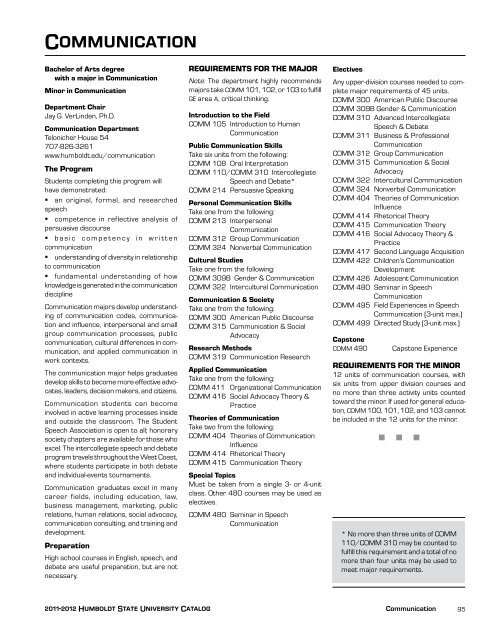2011-12 Academic Year - Bad Request - Humboldt State University
2011-12 Academic Year - Bad Request - Humboldt State University
2011-12 Academic Year - Bad Request - Humboldt State University
Create successful ePaper yourself
Turn your PDF publications into a flip-book with our unique Google optimized e-Paper software.
Communication<br />
Bachelor of Arts degree<br />
with a major in Communication<br />
Minor in Communication<br />
Department Chair<br />
Jay G. VerLinden, Ph.D.<br />
Communication Department<br />
Telonicher House 54<br />
707-826-3261<br />
www.humboldt.edu/communication<br />
The Program<br />
Students completing this program will<br />
have demonstrated:<br />
an original, formal, and researched<br />
speech<br />
competence in reflective analysis of<br />
persuasive discourse<br />
basic competency in written<br />
communication<br />
understanding of diversity in relationship<br />
to communication<br />
fundamental understanding of how<br />
knowledge is generated in the communication<br />
discipline<br />
Communication majors develop understanding<br />
of communication codes, communication<br />
and influence, interpersonal and small<br />
group communication processes, public<br />
communication, cultural differences in communication,<br />
and ap plied communication in<br />
work contexts.<br />
The communication major helps graduates<br />
develop skills to become more effective advocates,<br />
leaders, decision makers, and citizens.<br />
Communication students can become<br />
involved in active learning processes inside<br />
and outside the classroom. The Student<br />
Speech Association is open to all; honorary<br />
society chapters are available for those who<br />
excel. The intercollegiate speech and debate<br />
program travels throughout the West Coast,<br />
where students participate in both debate<br />
and individ ual-events tournaments.<br />
Communication graduates excel in many<br />
career fields, including education, law,<br />
business management, marketing, public<br />
relations, human relations, social advocacy,<br />
communication consulting, and training and<br />
development.<br />
Preparation<br />
High school courses in English, speech, and<br />
debate are useful prepar ation, but are not<br />
necessary.<br />
<strong>2011</strong>-20<strong>12</strong> <strong>Humboldt</strong> <strong>State</strong> <strong>University</strong> Catalog<br />
REQUIREMENTS FOR THE MAJOR<br />
Note: The department highly recommends<br />
majors take COMM 101, 102, or 103 to fulfill<br />
GE area A, critical thinking.<br />
Introduction to the Field<br />
COMM 105 Introduction to Human<br />
Communication<br />
Public Communication Skills<br />
Take six units from the following:<br />
COMM 108 Oral Interpretation<br />
COMM 110/COMM 310 Intercollegiate<br />
Speech and Debate*<br />
COMM 214 Persuasive Speaking<br />
Personal Communication Skills<br />
Take one from the following:<br />
COMM 213 Interpersonal<br />
Communication<br />
COMM 3<strong>12</strong> Group Communication<br />
COMM 324 Nonverbal Communication<br />
Cultural Studies<br />
Take one from the following:<br />
COMM 309B Gender & Communication<br />
COMM 322 Intercultural Communication<br />
Communication & Society<br />
Take one from the following:<br />
COMM 300 American Public Discourse<br />
COMM 315 Communication & Social<br />
Advocacy<br />
Research Methods<br />
COMM 319 Communication Research<br />
Applied Communication<br />
Take one from the following:<br />
COMM 411 Organizational Communication<br />
COMM 416 Social Advocacy Theory &<br />
Practice<br />
Theories of Communication<br />
Take two from the following:<br />
COMM 404 Theories of Communication<br />
Influence<br />
COMM 414 Rhetorical Theory<br />
COMM 415 Communication Theory<br />
Special Topics<br />
Must be taken from a single 3- or 4-unit<br />
class. Other 480 courses may be used as<br />
electives.<br />
COMM 480 Seminar in Speech<br />
Communication<br />
Electives<br />
Any upper-division courses needed to complete<br />
major requirements of 45 units.<br />
COMM 300 American Public Discourse<br />
COMM 309B Gender & Communication<br />
COMM 310 Advanced Intercollegiate<br />
Speech & Debate<br />
COMM 311 Business & Professional<br />
Communication<br />
COMM 3<strong>12</strong> Group Communication<br />
COMM 315 Communication & Social<br />
Advocacy<br />
COMM 322 Intercultural Communication<br />
COMM 324 Nonverbal Communication<br />
COMM 404 Theories of Communication<br />
Influence<br />
COMM 414 Rhetorical Theory<br />
COMM 415 Communication Theory<br />
COMM 416 Social Advocacy Theory &<br />
Practice<br />
COMM 417 Second Language Acquisition<br />
COMM 422 Children’s Communication<br />
Development<br />
COMM 426 Adolescent Communication<br />
COMM 480 Seminar in Speech<br />
Communication<br />
COMM 495 Field Experiences in Speech<br />
Communication (3-unit max.)<br />
COMM 499 Directed Study (3-unit max.)<br />
Capstone<br />
COMM 490 Capstone Experience<br />
REQUIREMENTS FOR THE MINOR<br />
<strong>12</strong> units of communication cours es, with<br />
six units from upper division courses and<br />
no more than three ac tivity units counted<br />
toward the minor. If used for general education,<br />
COMM 100, 101, 102, and 103 cannot<br />
be included in the <strong>12</strong> units for the minor.<br />
n n n<br />
* No more than three units of COMM<br />
110/COMM 310 may be counted to<br />
fulfill this requirement and a total of no<br />
more than four units may be used to<br />
meet major requirements.<br />
Communication<br />
95

















